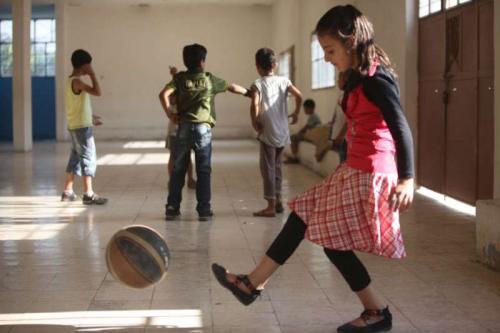UN refugee agency reports increase in number of Syrians crossing into Lebanon
The United Nations refugee agency is seeing an increase in the number of Syrian refugees arriving in eastern Lebanon's Bekaa Valley, with local charities and authorities reporting about 2,200 people settling in the east over the past week – almost double the recent weekly average, according to a spokesperson for the agency.

UNHCR and partners have organized activities for Syrian refugee children in the Bekaa Valley.
“UNHCR is adding new telephone hotlines to help the increasing number of refugees seeking to register,” a spokesperson for the Office of the UN High Commissioner for Refugees (UNHCR), Adrian Edwards, told a media briefing in Geneva.
“The tense security situation in Tripoli last week meant many refugees were unable to make their registration appointments. The centre is now open and operations have returned to normal,” he added, noting that in northern Lebanon the arrivals rate remains steady at about 400 people arriving every week.
UNHCR is also monitoring the situation for refugees in the northern border area of Akkar, which is still affected by shelling from the Syrian side of the border. The villages of Al-Nura and Debbabiyeh, which host more than 80 refugees, saw nearby shelling in recent days, the spokesperson said.
More than 18,000 people, mostly civilians, have died since the uprising against President Bashar al-Assad began nearly 18 months ago. There have been reports of an escalation in violence in recent weeks in many towns and villages, as well as the country’s two biggest cities, Damascus and Aleppo. As of Thursday, some 229,000 people had left the country and sought refuge in neighbouring countries such as Iraq, Jordan, Turkey and Lebanon.
“Across Lebanon, the squeeze on shelter remains one of our biggest concerns with many refugees still staying in schools that are supposed to open in a week or two for the new school terms,” Mr. Edwards said.
Twenty families were evicted from a school in al-Marj, in west Bekaa, earlier this week but were allowed to extend their stay following intervention by UNHCR and its non-governmental partner organizations, as well as Lebanon’s Ministry of Social Affairs.
“We continue to search for alternative shelter for refugees staying in schools, and are running a hotline for refugees who are coming under pressure to vacate. So far, we've received 20 reports of refugees being pressured to leave,” Mr. Edwards said. “We are monitoring these cases and asking for understanding by local school authorities to avoid Syrians being evicted.”
He added, “Last week we submitted to the authorities a list of 11 abandoned buildings we propose to refurbish to house refugees. So far we have received permission to use three of these and are waiting for further approvals for the renovations. We hope the government can expedite the remaining approvals.”
Mr. Edwards noted that the refugee agency’s shelter strategy in Lebanon includes a mix of refurbishing buildings to house Syrians and offering cash for shelter grants for the most vulnerable.
Addressing the same media briefing in Geneva, a UN Children’s Fund (UNICEF) spokesperson, Patrick McCormick, said the agency was deeply concerned about the situation, as children who are meant to go back to school are currently stuck in refugee camps and makeshift shelters.
Mr. McCormick stressed that many challenges remain, including the provision of access to services such as water and sanitation, but noted that UNICEF would not be able to tackle the emergency properly until there was a political solution.
Source: UN News
- 470 reads
Human Rights
Ringing FOWPAL’s Peace Bell for the World:Nobel Peace Prize Laureates’ Visions and Actions

Protecting the World’s Cultural Diversity for a Sustainable Future

The Peace Bell Resonates at the 27th Eurasian Economic Summit

Declaration of World Day of the Power of Hope Endorsed by People in 158 Nations

Puppet Show I International Friendship Day 2020

